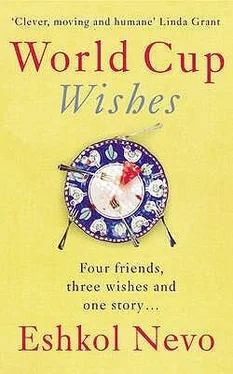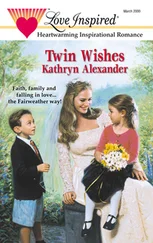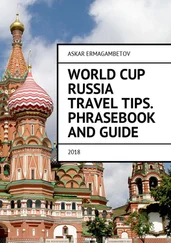He really was naked when I found him. But alone. Covered in his own vomit and in the throes of a very serious attack of paranoia. It seemed that the gods had spoken to him and told him to undress. It seemed that he thought the hill we were standing on was full of tigers that had horses’ heads. It seemed that he thought everything he said was coming out enormously loud and could be heard all around the globe. And he was afraid his parents would hear it back home. In fact, his parents had come to visit him here, now, after he vomited. And he finally told his father what he thought of him and his women. But now he was scared. No, not of his father. Of the Indians’ gods. They were angry with him and he couldn’t understand why. And he was thirsty, as thirsty as if he’d walked through the desert for forty years, but he couldn’t put a drop of water in his mouth, so maybe I could drink for him, instead of him, he meant.
I opened my bottle of water and shoved it in his mouth. Then I helped him get dressed and dragged him back towards the ranch. I kept a close watch on him, waiting for the effects of the drug to start fading, meanwhile making sure that he drank and ate enough. At night, after I thought he’d recovered, he suddenly had a horrible attack of anxiety that if he fell asleep, he wouldn’t be able to tell the difference between reality and dreams when he woke up. I promised him I’d be his sign of reality, that every time he wasn’t sure, he could call me. He called me a dozen times that night. And every time, I got up, went over to his bed and stroked his head till he fell asleep.
I want you to know, amigo, that I’ll remember you my whole life, he told me two days later, inside a van that was taking us back to the city. We were leaning on our rucksacks and a pleasant sun was dancing on our naked chests.
It’s nothing, I said.
It definitely isn’t nothing, he insisted. If you hadn’t come looking for me, I would’ve dehydrated. At best. At worst, bandidos would have passed through, shaved off my pauchos and for dessert, shot me through the heart, I mean corazonos .
Don’t exaggerate, I said.
I’m not, he insisted.
Anyway, I owed you for Cusco, I said.
OK, now that really was nothing, he said.
*
It wasn’t nothing. I didn’t think so and neither did the local doctor (who was also the local pharmacist and also the local travel agent and also the only person in town who spoke English). He examined me in a storeroom full of empty cardboard boxes, behind the pharmacy, after my temperature went up to 39.4 centigrade, and I had chills all through my body. You have ‘gringo fever’, he said, and explained that it was a fever that mostly tourists got. There is no medicine for it, and it could last from a week to a month. The only treatment is rest, lying in bed and waiting patiently for it to pass. And you, Big Guy, he said to Churchill, stay close to your friend. Make sure he drinks and check his temperature every few hours to see that it doesn’t go past forty. If that happens, let me know right away because that means the disease has entered its second stage.
Churchill followed the doctor’s orders meticulously.
At the end of the first week, he met a girl in Posada named Keren, who’d been at university with him. She’d had a boyfriend then, but not now. They started having breakfast together and went out at night after I was asleep.
Churchill spoke passionately to her. To be accurate, I’d never heard him talk to a girl like that. That Keren has something, he said. She has a secret.
A few days later, she suddenly vanished from his stories. I asked about her, and he said she’d gone. Continuing her trip. So why didn’t you go with her? I asked.
I asked her to wait a little, till you got well, and then we’d go. She said that ‘Whatever is supposed to happen will happen’, and that ‘If we’re meant to meet, we’ll meet’.
Too bad you didn’t go with her, I said. She had a secret.
That’s crap, Churchill said angrily, she pretended she had a secret to drive me crazy.
I didn’t say anything. The way Churchill spat out that ‘crap’ was proof that giving up Keren wasn’t easy for him at all.
My thermometer beeped and he took it out of my mouth. We’re getting better, he said. Thirty-eight point six. And after a short break, he added, as if to himself: girls come and go. Friends stay.
*
I reminded him of that remark when he called to confess about Ya’ara.
He was silent. Didn’t deny that he’d said it. Didn’t claim that I was quoting him out of context.
I kept on reminding him of that remark even in the internal dialogues I had with him later on. What happened? I’d ask him. What changed in the three years that passed since then? Did your priorities change or did you just turn into a shitty person?
He never answered me. That’s how it is with internal dialogues, you can sling as much mud as you want and there’s no one to answer back. And so, in my mind, I wished he would lose all his cases from now on, not just lose, but lose for the most humiliating reasons. Because he didn’t prepare witnesses properly. Because he misplaced the plastic bag with one of the main pieces of evidence inside. Or because the defence attorney surprised him with a legal precedent that every lowly clerk should know, and he’d have to explain that to the district attorney. And lower his eyes as he spoke.
I wished him all that — and I missed him. His inner fire that had something inspiring about it. The way he focused totally on every conversation with a friend, no matter how busy he was. Or troubled. Or tired. That quick, smiling glance he’d give me when I spoke a private thought out loud, signalling to me that he knew exactly what I was talking about: that he’d seen the movie, read the book or, like me, he’d picked up on the absurdity of a situation everyone mistakenly thought was serious.
It had been with that kind of look that our friendship came into being. It was the week of our junior year when we went out for pre-army training. All the junior classes were moved to an army camp in the south, and for five days, we played soldier. They dressed us in uniforms. Split us up into companies. Ran us ragged. Hassled our arses. And we gave ourselves up to the new order. That is, most of us did. Only a few stood at the window wondering why the hell we had to cross that bridge before we got to it. That is, if we were doomed to be shackled, we’d be shackled. But why start it in high school?
Hey, you think they’ll let us out for the weekend? I asked during one of the short canteen breaks they gave us, and no one thought it was funny. Except Churchill. I think it’s a definite — perhaps! he said, imitating the decisive voice of our buzz-cut unit commander, smiled at me with his eyes and when the break was over, asked me, only me, if I’d like to skip the next parade with him. When that made me hesitate (it’s one thing to laugh at the accepted routine, and another to deviate from it), he said he’d checked it out and they had no legal authority over us. In fact, he promised, they can’t do a thing to us if we don’t show up for parade. Not a thing.
I was persuaded and stayed in the canteen with him. And it had the taste of rebellion. We ate chocolate bars and talked about how Rona Raviv looked good even in uniform, and how the movie Dune wasn’t nearly as good as the book, and why it was better to learn how to drive on a manual than on an automatic. Churchill held forth and I mostly listened, but he was curious about the few things I did say, and that encouraged me to talk more than I usually did. I found myself telling him that I played chess once a week in an old men’s club. And he didn’t make fun of that, instead he asked me to play against him on Saturday. If they let us out for the weekend, I reminded him. And he laughed again. I thought it was generous of him to laugh at the same not-very-funny joke twice. After our game on Saturday, he talked me into going out to the Little Haifa pub because an aircraft carrier from the Sixth Fleet was anchored in the port then, and there would probably be a lot of American sailors in white there, getting drunk and singing with wet throats, ‘Bye bye Miss American pie’. That is a sight you really have to see, he said. After that Saturday, we became friends. I’d had friends before him, but they were all my type: short, gloomy, the ones stuck to the walls at parties, and during breaks at school they read science-fiction magazines. They were the ones who knew the Maccabi Haifa line-up by heart, including subs, but never went to matches, who made fun of everything in beautifully constructed sentences, but started stammering the minute a girl said something to them.
Читать дальше












